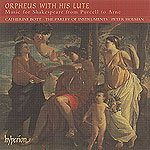In 1997 soprano Catherine Bott, three other vocal soloists, and The Parley of Instruments participated in a widely acclaimed Hyperion program “Hark! Hark! The Lark”. The recording, Volume 43 of the label’s ongoing English Orpheus series, was devoted primarily to Shakespeare settings. This new offering (Volume 50) focuses exclusively on the Bard (its title comes from one of Shakespeare’s most commonly set texts) and features Bott as the lone soloist with the same ensemble in an expertly performed and arguably more compelling program. Bott’s livelier, more declarative performance of Thomas Chilcot’s Hark! Hark! The Lark (from Cymbeline) bears a far more convincing relationship to the urgency of the text than does tenor Joseph Cornwell’s rendition of Robert Johnson’s setting, heard on the earlier recording. Likewise, while the contributions of the three other soloists admittedly afford Volume 43 more vocal variety, some selections (particularly those set to Fletcher and Suckling) are less inspired than the ones Bott and her colleagues have chosen here.
Two other worthy Chilcot settings–“Pardon, goddess of the night” (from Much Ado about Nothing) and “Orpheus with his Lute”–are performed with equal passion and vigor. In the former the devastating resignation of Bott’s final lines–“Graves, yawn, and yield your dead, Till death be uttered…Heavily…Heavily”–is even more powerfully augmented by Chilcot’s darkly atmospheric orchestration. Chilcot’s setting of the program’s title selection is equally inspired, featuring Rachel Brown’s obbligato flute set amid pizzicato strings, auspiciously evoking Orpheus’ mythical instrument as well as cleverly providing an effective, complementary rhythmic momentum.
Other highlights include settings by Richard Leveridge and Thomas Arne of one of Shakespeare’s most notoriously erotic texts, “When daisies pied and violets blue” (from Love’s Labour’s Lost). Here both composers–and Bott–rightly place special emphasis on the double entendre implicit in Shakespeare’s frequent and often humorously mocking use of the word “cuckoo”. By contrast, in John Christopher Smith’s “Full fathom five” (from The Tempest) Bott’s quiet, stream-of-consciousness delivery lucidly complements Shakespeare’s dream-bordering-on-nightmare sequence. In Henry Purcell’s “Dear pretty youth”, Bott’s flawless enunciation and cool reserve impressively exploit the text’s frequent nuances of hapless desperation.
Hyperion’s detailed sound is quite good, with Bott located slightly forward in the mix. Parley of Instruments director Peter Holman’s concise yet often fascinating notes place the 22 selections in historical perspective. In sum, this is another fine addition to an already very distinguished series. [8/6/2004]
































